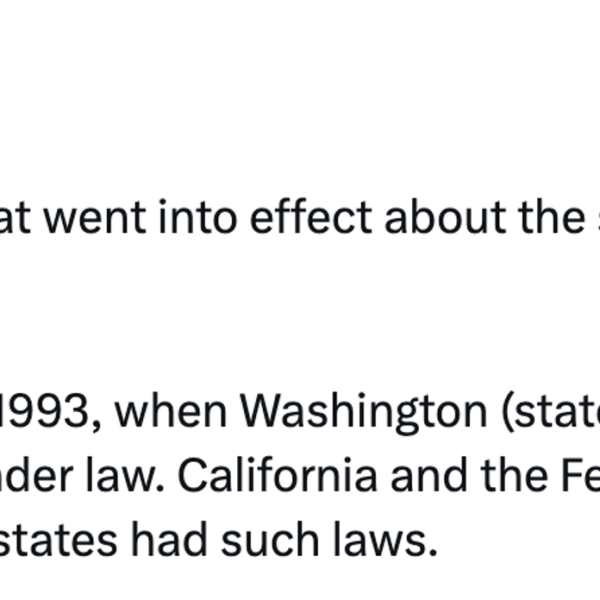

(Photo: Bob Jagendorf Creative Commons)
By Steve Pomper
I was an officer on one of Washington State’s first (it may have been the first) “Three Strikes law” (a 1993 voter-passed initiative) court cases. The law required that after a person is convicted for a third (qualifying) violent felony, which he was, it’s off to the hoosegow for life. I had no problem with that.
This stiff sentence is not something the “system” was doing to him because he controlled his criminal actions. He decided to commit violent crime, not once, not twice, but three times (and got caught), obviously not learning his lesson.
And if you think three is too low a number, it’s very likely he’d committed several other violent crimes for which he was not arrested, charged, prosecuted, convicted, and imprisoned. No criminal is that unlucky to be arrested for the only three violent felonies he committed.
The thing that got me was when one bleeding heart I knew asked me if I could sleep at night knowing that I helped send this “human being” to prison for life. “Like a baby,” I answered.
I saw him as an adult who’d made his own choices, which included making other people’s lives miserable, and now he’d suffer the consequences he’d earned.
Various jurisdictions combined several cases for this guy’s trial, which included an armed robbery of a gas station and other violent felonies I can’t recall. In my case, this charming individual had kicked in the door of a 90-something-year-old man, knocking him down, and stealing—of all things—his banjo. That’s a home invasion robbery, folks. Testifying in court, I was thinking about the victims, not the suspect.
At any rate, some of this state’s soft-on-crime activists, legislators, judiciary, and prosecutors have sought to hollow out the law almost since its inception. One result was to resentence 114 three-strikes convicts to lighter sentences.
Of course, this negates the law’s original intent and pretty much assured that there would be victims out there who will be injured or killed who would not have been had the original convictions remain in place. And that’s what happened.
One of those victims was 14-year-old Chelsea Harrison whom (one of the 114 resentenced) Roy Russell, 45, had, according to prosecutor Jim Senescu to KGW 8 News, “raped, beaten and strangled to death and her naked body was dumped upside down in the shower….”

Russell’s is one of the more egregious cases. Convicted of second-degree murder, instead of 21-30 years, the judge recognized his danger to society and “sentenced him to life under the state’s three-strikes law.
For years, Russell had refused to admit he’d killed Harrison. But, in a sick twist, allowed by Washington’s pro-criminal legislature, after the law changed, he admitted to the murder, which, perversely, allowed him to qualify for resentencing.
It gets worse. Beginning in the 1980s, Russell had been convicted of several felonies, “including armed robbery, kidnapping, theft and arson.” There’s no way this slime should ever have been anywhere near leniency or any benefit of the doubt.
In 1998, after a judge sentenced him to life for the first time, under the three-strikes law, Russell appealed a kidnapping conviction. In 2001, another judge decided, since he’d been convicted of the kidnapping in Arizona, it “did not qualify as a strike under state law.” The judge did not have to rule that way, but he did, and a 14-year-old Chelsea Harrison paid the price.
KGW reported, “His life sentence was lifted and he was released from prison not long before he met Chelsea Harrison.”
Anti-law-and-order radicals lament efforts to establish mandatory life sentences for violent criminals like Russell. But what choice do people who prefer—you know—law and order have when legislators, prosecutors, and judges abuse their discretion?
Washington passed the Chelsea Harrison Act “to close the loophole that allowed Russell to escape his first life sentence, expanding Washington law to include felony convictions in other states.”
Not to be outdone, in 2021, the radical left lawmakers passed Senate Bill 5164, giving Russell another opportunity at undeserved freedom. Senescu said, “Now we’re back to — he only has two strikes. It’s a deplorable thing that the lawmakers did.”
To show you how toxic Washington State’s criminal justice system is, the prime sponsor in the legislature for SB5164 was former state Senator Jeannie Darneille. After leaving the Senate, she was tapped to become the Assistant Secretary of the Women’s Prison Division. KGW said none of the bill’s co-sponsors would speak with them, including Darneille. Darneille recently retired from state service, according to the DOC website, “after [a] distinguished career” .

Three-Strikes laws, like in Washington State, happen when charging and sentencing become too lenient, even for heinous crimes as in the Russell case. At the NPA, I recently wrote about the New York Speaker of the Assembly who “doesn’t believe raising penalties is ever a deterrent to crime.”
There’s also the shamefully lenient sentence a judge handed down to a convicted Indiana cop killer, which amounted to a five-year prison sentence.
And there’s the San Francisco judge who sentenced a man convicted of stabbing a 94-year-old woman multiple times only to probation.
Then there’s a story out of Gwinnett County, Georgia, that, again, boggles the mind and can make cops wonder why they even do the job.
According to WSB TV 2 Atlanta, Stoney Williams, a suspect in a murder-for-hire case, who’d been in jail awaiting trial for allegedly “ordering a hit on his ex-girlfriend and business partner, Courtney Owens,” will serve only “house arrest and probation” under a plea bargain with Gwinnett County.
Why the light sentence? Gwinnett County “may have run out of time to try the case.” Reportedly, the DA “may have missed the deadline, impacting their ability to prosecute the case.” Essentially, they lost track of the court calendar in a murder case.
Prosecutors said Williams allegedly hired suspect Wesley Vickers to kill Owens who was reportedly killed after witnesses said a suspect “walked in, shot Owens, and then took off.” Vickers, was arrested a month later and “charged with felony murder, malice murder, and aggravated assault.”
Williams denied he paid Vickers to kill Owens. The glitch seemed to hinge on Williams having asserted his right to a speedy trial. In a major case like this, how did the DA not keep track of speedy trial constraints? Doesn’t that come during Lawyering 101 early in law school?
However, I won’t outright condemn the DA’s office because I don’t know what happened, and people make honest mistakes. However, while in the past I might have read something like that and immediately paused, remained disturbed, but understand that technicalities do happen. Still, today, with so many “glitches” allowing criminals off with light or even no sentences, I don’t pause so much as come to a screeching halt as my jaw hits the floor.
I also have to wonder why these “errors” so rarely go in the other direction.






